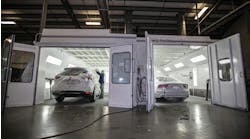Remember back a decade or two, when police dramas were all the rage on television? Shows like Hill Street Blues, NYPD Blue and The Shield often showcased rogue cops who sometimes crossed the line to get what they wanted, prompting a visit by the investigator from the dreaded Internal Affairs Department. Cops never liked the "IAD" guy because his job was to rat out the bad operators on the force.
In the collision repair industry, Post Repair Inspection shops have become the Internal Affairs Department to a degree. Their job is to investigate a repaired vehicle and make a determination of how well the initial shop did based on the quality of the repair.
Post repair inspection shops have the necessary tools to spot any shortcuts that may have been taken in the original job and identify sub-standard material and equipment that could potentially render the vehicle unsafe to drive.
From that perspective, one might think that the duty of a post repair inspection service is a noble one. But many collision repair shops fear the post repair inspection process because it's designed to catch their mistakes, judge the quality of their work or, in some cases, rat out rogue operations.
That often puts post repair in an unfavorable light. But I maintain that the negative perceptions and the fear of post repair can be mitigated if shops would just start policing themselves.
How? Here are a few suggestions:
Challenge the insurer. Insurers have a ton of control over the repair process, which mainly focuses on the bottom line and the drive to save dollars. The constant push for high volume and unrealistic cycle time numbers leads to hurry-up processes and gaps in quality. You can stand up to the insurer if you're armed with the proper documentation that validates your repair plan, including the manufacturers' guidelines, ALLDATA research and other information to support your argument for performing the repair correctly.
Know how to correctly repair the vehicle. If your technicians are adhering to the manufacturers' guidelines and regularly reviewing technical bulletins, then you'll greatly decrease mistakes or defects in the repair. Further, if you're instituting verification steps alongside the entire repair process, you'll ensure a high degree of quality in each repair job.
Do quality control right. Audit the repair estimate line by line to ensure that you've followed the repair plan and address every item listed. Review every line on your bill to verify that the work has been performed. Inspect the job using technical documentation. Make your technicians responsible for validating each step in the repair process.
Use OEM parts wherever appropriate. A dollar saved on a non-OEM part could cost you thousands of dollars in the long run. Most post repairs cite inferior or substandard parts in the inspection process. Why take that risk when all you have to do is use the proper parts to begin with?
Keep your techs properly trained. We all know that cars are becoming increasingly technical, which requires more in-depth tech training and proper certification to repair. Sure, training is expensive and eats up a lot of time, but the investment in your staff will result in higher quality work and reduce the liability later on.
Scan for fault codes. It's virtually impossible to fully understand all of the computerized and electronic systems in today's complex vehicle. Scanning for fault codes will identify what systems were affected as a result of the accident or during the disassembly and reassembly process.
Invest in a borescope. It may sound like I'm nit-picking here, but a borescope is absolutely critical if you're going to inspect and validate your work before it leaves the shop. Post repair inspections often uncover mistakes or substandard work with the help of a borescope. You can head that discovery off at the pass by making this validation step a standard part of the audit process.
There's no reason to fear the post repair inspection if you've incorporated your own inspection into every facet of your repair process. By performing your own post repair inspection you'll be motivated to keep your technicians continually educated, you'll ensure that your customer is safe and satisfied, you'll enhance your shop's reputation in the community and you'll experience a stronger operation and a healthier bottom line.



